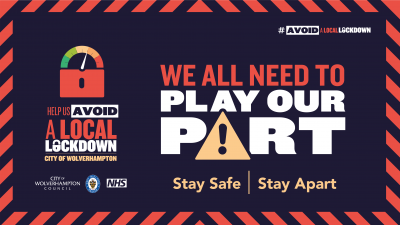Latest figures show there were 43.12 cases per 100,000 residents in Wolverhampton in the 7 days to 8 September, up from 11.83 cases in the week to 1 September, with the rise in cases mainly driven by a spike in infections among young adults.
Meanwhile, additional restrictions were announced in nearby Birmingham, Sandwell and Solihull this afternoon, banning contact between households from Tuesday.
John Denley, Wolverhampton's Director of Public Health, said: "We all need to take extra care to protect ourselves, our friends and our family from Covid-19.
"The virus infects people young and old, but the risk of severe disease increases with age.
"All the evidence suggests that people who are over the age of 60 or have underlying medical conditions like cardiovascular disease, diabetes, chronic respiratory disease or cancer are at a much greater risk of getting seriously ill.
"If you are older or in a clinical risk group, or you live with someone who is, it is even more important that you make sure you are following the Hands, Face, Space guidance and wash your hands more often, wear a face covering where you need to and follow social distancing guidelines.
"The rise in cases in recent days shows how easily Covid-19 is transmitted within households and from one family to another. This is a worry for us all, especially as winter approaches, and that’s why I'm calling on everyone to do all they can to help stop the spread of coronavirus."
Everyone should:
- practice social distancing when they are with anyone who is not a member of their household or support bubble (from Monday, it will be illegal to meet in groups of more than 6 indoors or outside, with some exceptions)
- wear a face covering in enclosed public places like shops and on public transport, unless they are exempt on medical grounds
- thoroughly clean frequently touched areas in the home or at work
- continue to wash their hands more regularly with soap, for 20 seconds at a time
Mr Denley continued: “If you are vulnerable and are back at work, please speak to your employer to make sure that your workplace is Covid-19 secure. Make sure that you have discussed any medical conditions you have so that your employer is aware and can ensure that any necessary measures have been put in place to protect your health and wellbeing.
“If you are travelling and from work, try not to car share, as this will help avoid any spread.
"If you are using public transport, you must wear a face covering unless you are exempt for any reason, and try not to touch any handles, buttons or rails with your hands – use your elbow or a tissue if possible and wash your hands or use hand sanitiser as soon as you can.
"Infection rates are rising most quickly among young adults, in the 18-30 age group, and we’ve seen from other countries that this may lead to a spike in hospitalisations and even deaths among older and more vulnerable people a few weeks later. So if you in the at risk group, please take extra care when you are around other people.
"It’s also more important than ever to get your flu jab this winter. It’s available to everyone, but is free of charge to many who are at greater risk from Covid-19. Speak to your GP and book your appointment as soon as possible.
"It's also important to keep your mind and body fit and active at this time; try to exercise outside or at times of the day when it’s easier to social distance, and why not borrow books or other items using the We Select, You Collect service available from Central, Warstones, Bilston or Wednesfield libraries, or our Home Library Service which delivers books to customers of any age who, because of illness, disability or frailty, cannot get out and about easily."
For details of those deemed at greater risk from Covid-19, please visit Who’s at higher risk of coronavirus.
Symptoms of Covid-19 include a fever, a new, continuous cough and loss or change to a person’s sense of taste and smell. People with symptoms, no matter how mild, should immediately self-isolate and book a test by visiting Coronavirus (COVID-19) or calling 119.
The latest information and guidance around coronavirus is available at GOV.UK and on the council’s own coronavirus pages at Coronavirus advice and information. There’s lots of advice on how people can protect themselves and their families from coronavirus from the NHS at Coronavirus (COVID-19).
The council’s Stay Safe, Be Kind campaign offers clear and simple advice about how people can help themselves, and how they can support others who may be particularly vulnerable at this time. For more information, please visit Stay Safe, Be Kind.
